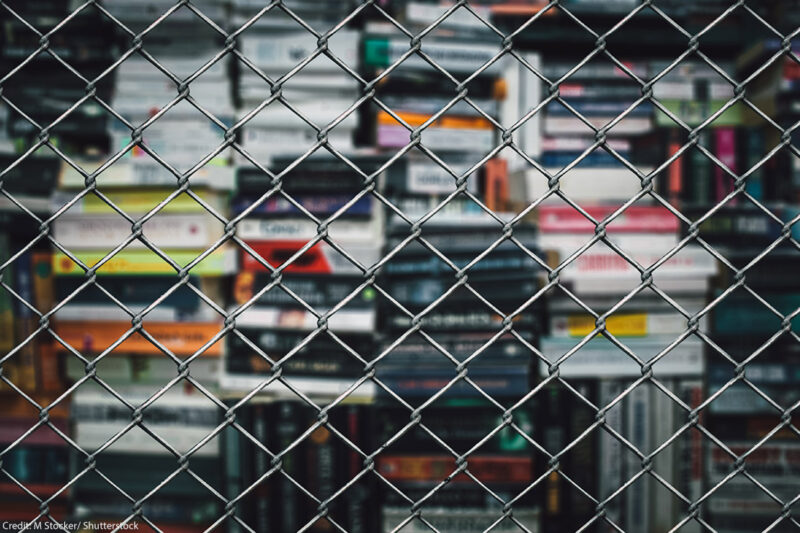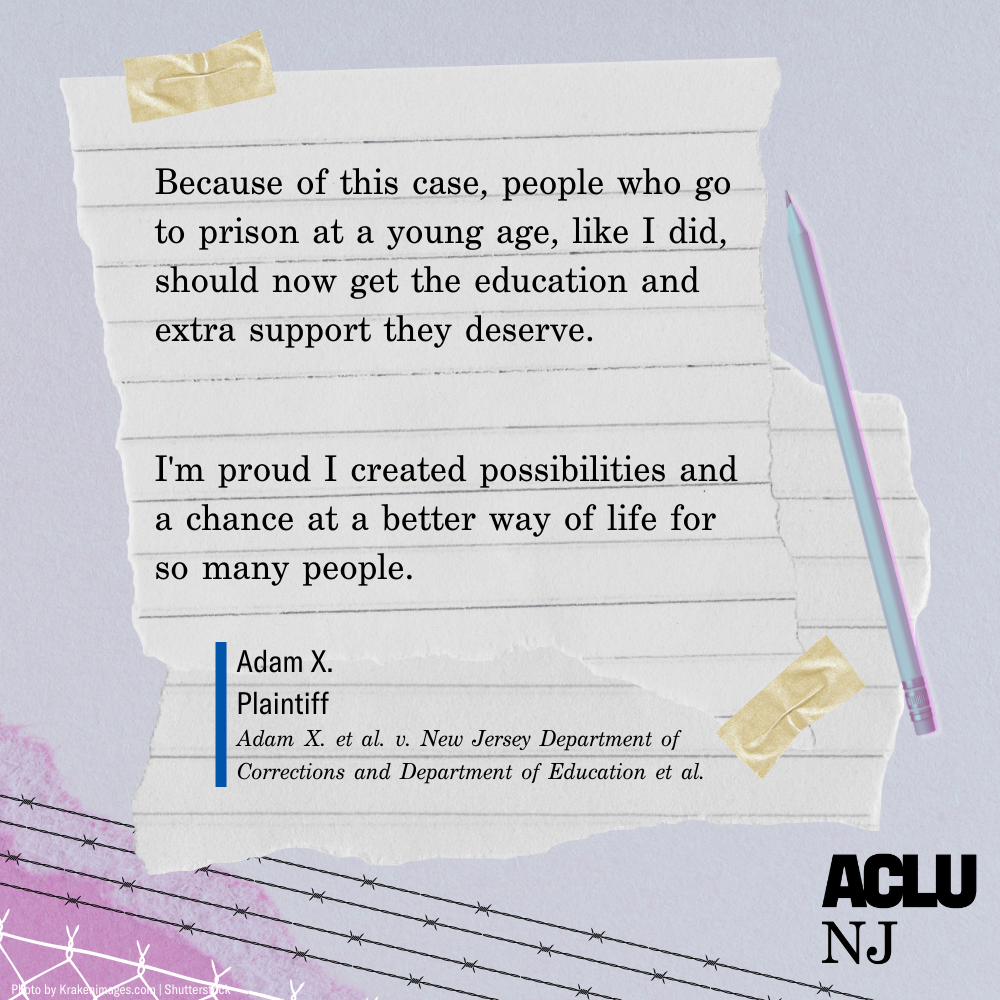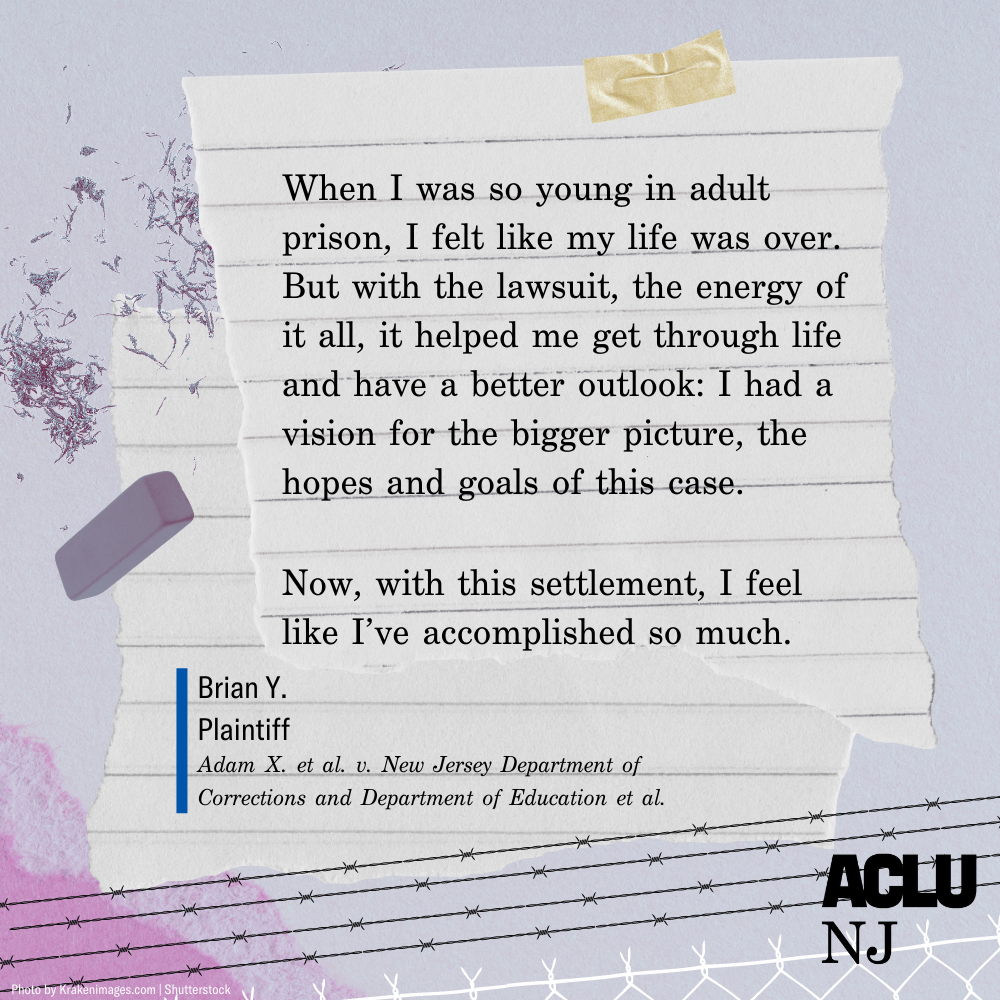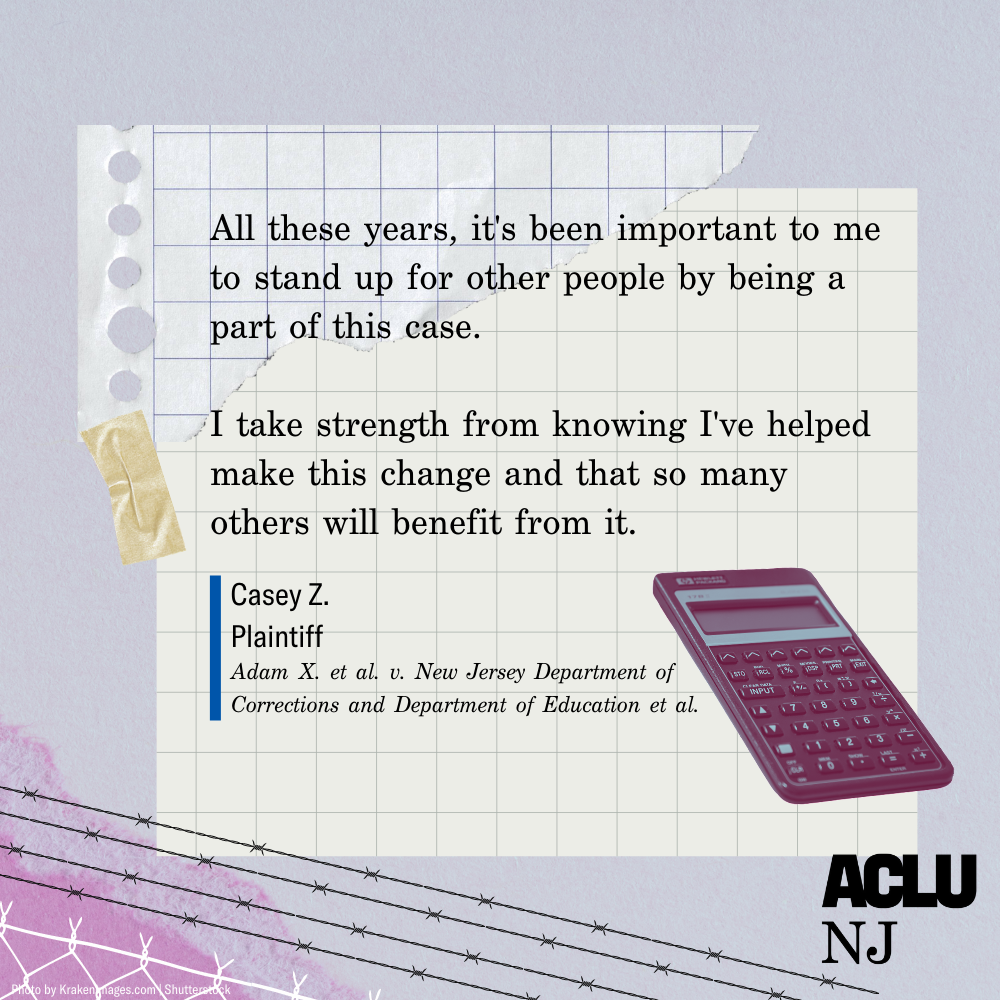A Student’s Journey: Fighting for Education Rights While in Prison


Young people with disabilities have a legal right to a free and appropriate public education, even when they are incarcerated. But for years, the educational needs of high school students in New Jersey’s state prisons were not being met.
That’s changing now, and Brian Y. is a big reason why.
Brian Y. entered state prison before he turned 18. He knew he had a right to an education inside, and he knew that as a student with disabilities, he was entitled to special education and related services.
He also knew his rights were being violated. So he took action.
The lawsuit, , was initiated five years ago by three students — Adam X., Brian Y., and Casey Z. (pseudonyms) — who alleged they were denied special education in prison. Thanks to their calls for change, the students’ legal team, including the ACLU of New Jersey Foundation, Disability Rights Advocates, and Proskauer Rose LLP, spent years investigating and litigating the case, which was certified by the federal District Court for the District of New Jersey as a class action in July 2021.
Their work was rewarded: On March 3, 2022, the District Court granted final approval of a settlement agreement that will usher in new policies to guarantee that students with disabilities in New Jersey prisons receive the special education and related services they are entitled to. The settlement also provides opportunities for make-up services and funds for those who were deprived special education in prison in the past, and ensures meaningful implementation of the new policies through a five-year monitoring plan.
Estimates suggest over 400 people may be impacted by the settlement — Brian Y. himself will receive $32,000 in compensatory education funds as part of the agreement.
We spoke with Brian Y., now 24 years old, about his education in prison and how his action resulted in a landmark settlement that will change the lives of young people denied services in prison. He talked about the experience in his own words.
This interview, which originally appeared on the ACLU of New Jersey’s , has been edited for clarity.
ACLU-NJ: What made you decide to take action to get an equal education?
Brian Y: I knew from my time in regular school that what was happening wasn’t normal. But all of this was my first time in jail or prison, so I thought that it was the norm: A tenth grader and a seventh grader all in the same class.
I was getting frustrated. I’d think to myself: “How is it that we have a teacher who doesn’t know the answer to certain questions?”
I brought this up with [an advocate]. They were shocked. So, they introduced me to the ACLU-NJ. And from there, the doors opened.
ACLU-NJ: What were the school materials you had like?
Brian Y: We didn’t even have textbooks. They had been recycled for years and were so outdated. The majority of the whole prison was working on the same lessons because it was the only thing they had available.
The teachers are supposed to be there for us, to teach us, but it was a jail mindset, just babysitting — they’d slide worksheets under the door.
ACLU-NJ: When you were in administrative segregation, you received instruction in a literal cage. What was it like to be educated in an environment like that?
Brian Y: I was so young. I don’t even know how to describe it. I felt like an animal.
I’m sitting in a room right now looking at a square table. Now, imagine us in a room. It’s you and the table, and everything around you is three stories high. Everyone is looking down at you.
And you’re in the middle, with lights on you, and a cage all around you. People outside are screaming and yelling. You’re trying to focus — but how can you? You can’t focus.
I remember being in the cage constantly jumping from the sounds. You could put your hand down and unintentionally make a loud noise. You’d hear people folding and stepping on the milk and juice cartons to make popping sounds. You would hear the metal keys. Everything was a loud noise. It was painful. It’s unreal, still thinking about it now. It was sad.

ACLU-NJ: What are your thoughts about missing out on educational services that you should have received?
Brian Y: The seven years I spent in the Department of Corrections, I was cheated out of education, and not learning the things I would have been if I was getting the right education. It’s going to have a huge impact on my life. You know everyone tells you, “Pay attention in school, you’re going to need it.” And here I am now saying the same thing.
ACLU-NJ: You were critical to the development of this case. What was it like to help your lawyers develop the complaint and prepare the suit?
Brian Y: It was exciting being a part of the lawsuit. It was unbelievable. It was like out of a movie. I was like an undercover lawyer. I’d ask questions in the classroom to find out what kinds of services other students were getting — or really, what services they weren’t.
Imagine being locked up at that age and having another inmate coming up to you and asking: “Do you have an IEP? What grade are you in? Why are you doing the same packet I’m doing? Do you get extra tutoring?”
A lot of the work I did to investigate took place when I was put in solitary confinement, taking notes on whatever small pieces of paper I had so I could use them later. Even helping other inmates to fill out forms for legal help: if they couldn’t mail it out themselves, I would put a stamp on it and make sure it got out.
Everyone I talked to or interviewed had a different story, and I was excited to see what impact they could have. It was a challenge for me — to see what I could uncover, or what role the next person I could get involved would have.
ACLU-NJ: After feeling like your concerns were ignored for so long, what was it like after you and your lawyers initiated the suit?
Brian Y: It felt amazing. Like 21 Jump Street, where an investigation blows up, and you laugh about it afterward.
I knew first when the lawsuit was announced and it was covered in the news, because all the teachers started finding out and losing their mind.
Deep down inside, I’m like, “I’m the man, I did this work. I made it happen!” I felt very overwhelmed and joyful.
ACLU-NJ: What did it feel like when you signed the settlement agreement, with your signature on the same document as the Department of Corrections commissioner?
Brian Y: Since getting out, I became a business owner. But signing my name to the changes the Department of Corrections would make felt even more powerful than turning the key to my shop for the first time.
There are so many people inside who have been there for years but didn’t have a way to change anything. Being so young and managing to make the change that we did is amazing.

ACLU-NJ: What differences do you think we’ll see from before the settlement and after?
Brian Y: That’s a good question. And a scary question.
With the settlement and the changes that are coming, there will be new requirements, a monitor to make sure they’re carried out, and all that. It’s scary, because there’s so much that needs to be done. Even when the lawsuit first broke — a lot of people weren’t ready for it.
But it’s good. Because you’re going to see the teachers who want to help, the ones who love education — they’re the ones who are going to stay. Those are the folks going to their boss saying, “We’re not doing enough to teach people.”
For the inmates who want to turn their lives around, they’re going to love this. There are so many people who want to learn but we were limited. The hope is for this lawsuit to lift those barriers. We weren’t getting special education services, let alone basic education or vocational training that we wanted. After this, things will hopefully change to give people the tools we need to be successful.
ACLU-NJ: How does it feel now, knowing you were a teenager when you started down this journey?
Brian Y: When I was so young in adult prison, I felt like my life was over. But with the lawsuit, the energy of it all, it helped me get through life and have a better outlook: I had a vision for the bigger picture, the hopes and goals of this case. Now, with this settlement, I feel like I’ve accomplished so much.
Knowing you’re the reason so many students in this predicament are going to have so much opportunity: It definitely means a lot. Especially coming from the bottom — coming up in a troubled environment, with early run-ins — making your voice heard and having a voice means a lot.
When I talk about it, it means so much to me, I really hold back tears. Sometimes I think to myself, “How did I get through it?” To deal with all of it, to become more powerful, to make change like that — it’s so good. Even with the mistakes I made in life, I feel good about who I truly am.
Coming from all the way from the beginning of this case, to now standing up and shouting — having a voice! shouting! — it means a lot. I try to laugh a lot. As I’m talking about it, it really means a lot to me. And the laughing is really holding back tears.

ACLU-NJ: What does it mean to know that you made it possible for people to get an education closer to the one they deserve?
Brian Y: To me this means my voice was heard. And for the other students in the class action, our voices were heard. Luckily, I was able to initiate positive change. I know this is going to break barriers, and it’s going to continue moving in the right direction, and this is just the start.
And I know there are teachers in there who want to do real lesson plans, want to really teach. I feel like I made a difference not just for students who want to learn but also for teachers who didn’t have a voice and wanted to teach.
ACLU-NJ: The settlement gives you and others in your circumstances opportunities to pursue education and training to compensate for what you were denied. What does that mean to you personally?
Brian Y: The compensatory education funds mean a lot. I had never had that help, but I’m being helped now. It’s kind of late, in terms of the Department of Corrections trying to make up for an education that we missed at such an important age, but I feel incredibly proud to finally have these opportunities and to know I was part of that. The people who care about me encourage me to stick with my passion, so I never gave up. I was even contacting technical colleges.
But when we first talked about the settlement, more than the comp ed, it was about the DOC changes for me — so other people didn’t have to go through what I did, so they can get proper education.
ACLU-NJ: Already more than 90 people have submitted compensatory education forms as part of the program created for class members. Are you proud of that?
Brian Y: Like I said — I like to challenge myself now because of the ACLU and everyone else. Ninety — that’s still short for us, because I know there’s a lot more than that who are eligible. This is just the beginning but we’re going to get there.
ACLU-NJ: Did you ever think about not taking action to fix things?
Brian Y: With this whole case, I could have just kept going with the flow, saying to myself this is normal. People could have said, “You’re in tenth grade doing seventh grade work – that’s all good, you’re guaranteed to pass.” But I couldn’t — it’s not right.
I never asked myself what if I didn’t get involved with the suit, because I’m so glad I did. But if I didn’t — it’d be the same now as it was then: A lot of people missing out on education. Every step of the way just made me want to fight harder, work more. We made our voices heard for ourselves and for other people who wanted to help. I was so committed, and I knew what was at stake.
ACLU-NJ: Five years later, what lessons do you take away from this?
Brian Y: From when we first started the class action to now — five years doesn’t feel like five years. But to get things done right, it takes time. To get it done right and to see real change. The investigation process, the manpower, everything, it was well due. Well due. I just roll with the punches. I know it’s not a simple change. This is a big, big change. It’s only right that it takes its time and goes through the process so we can get it RIGHT. We want it to be 100.
Class Members may continue to submit Compensatory Education Forms for up to two years. Although the notice period is complete, Class Members and their loved ones may still reach out to Class Counsel at prisoneducation@aclu-nj.org or prisoneducation@dralegal.org or by calling 973-854-1700.

